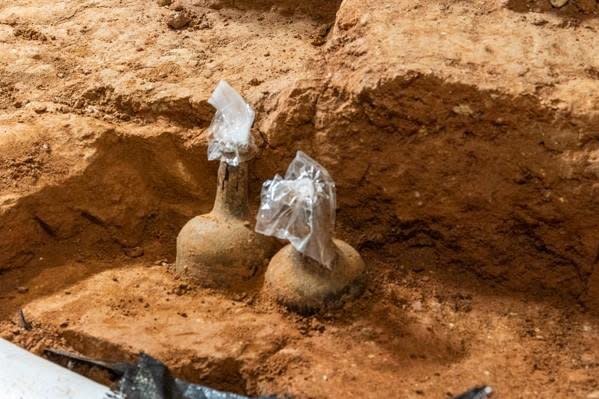Excavation unearths cherries in cellar of George Washington's Mount Vernon

June 16 (UPI) -- Archaeologists excavating at George Washington's home at Mount Vernon in Virginia, have unearthed 35 glass bottles filled with perfectly preserved berries and cherries.
The bottles were located in five storage pits in the mansion's cellar during an ongoing, $40 million renovation project started last year. Of the 35 bottles, 29 were intact and held "perfectly preserved cherries and berries, likely gooseberries or currants," a press release from Mount Vernon said. They are "composed of materials and foodstuffs that are likely 250 years old."
The bottles were removed from the house's cellar and will be refrigerated until they can be sent from Mount Vernon's archaeology lab to an offsite location for analysis.
Researchers found 54 cherry pits and 23 stems in the early stages of analysis, which could suggest that the bottles were once full of cherries, the Mount Vernon release said.
"The cherries likely are of a tart variety, which has a more acidic composition that may have aided in preservation," it said.
Research shows that the cherries were probably harvested by snipping from trees with shears. The stems were neatly cut and purposefully left attached to the fruit before bottling, researchers said.
Excavators recently found two other intact bottles in the same cellar, Mount Vernon said. Those bottles, also from the 18th century, were also filled with cherries, liquid and pits.
"Now we know those bottles were just the beginning of this blockbuster discovery," Doug Bradburn, Mount Vernon President and CEO said.
"Never in our wildest dreams did we imagine this spectacular archaeological discovery," Bradburn said. "We were ecstatic last month to uncover two fully intact 18th-century bottles containing biological matter."
Bradburn added that the discovery of the bottles was an "unprecedented find" and said "nothing of this scale and significance has ever been excavated in North America."
"The bottles and contents are a testament to the knowledge and skill of the enslaved people who managed the food preparations from tree to table," said Jason Boroughs, Mount Vernon principal archaeologist.
Bradburn speculated that the bottles may have been inadvertently left behind when Washington left Mount Vernon to command the Continental Army.
"These artifacts likely haven't seen the light of day since before the American Revolution," he said. "It's so appropriate that these bottles have been unearthed shortly before the 250th anniversary of the United States."
The cherry pits may be used for future germination if they are viable, Bradburn said.
Mount Vernon has been working with the U.S. Department of Agriculture's Agricultural Research Service to analyze the contents of the bottles, and will most likely extract DNA from the cherries to determine their exact species.

